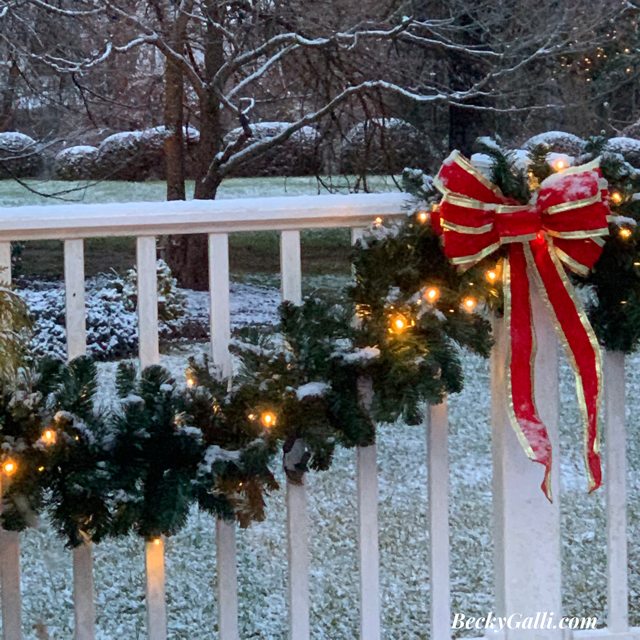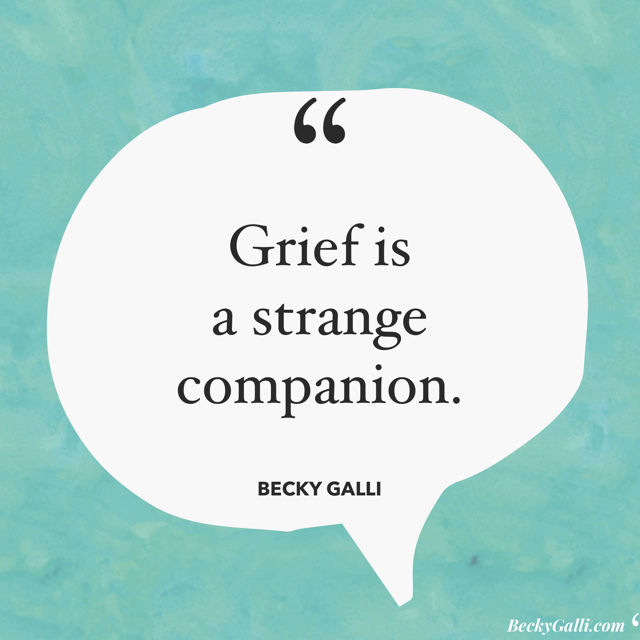
The event was several years ago, but I remember it often, especially during this time of year. I was invited to a seminar on dealing with loss during the holidays. Although I was interested in the topic, it was its title that sealed my attendance:
Meeting Grief with Grace.
I would have never imagined those two words—grief and grace—in the same sentence together. In my experience, grief has been a disturbing and painful foe, something most of us struggle to manage. Grace, on the other hand, is welcomed, an “unmerited kindness” as my father liked to call it—something we can either seek or give that’s comforting and soothing.
What a fascinating thought that one could help us get through the other.
At the conference room entrance, I was greeted by a comprehensive display of books and literature on grief including counseling services, support groups, workshops and even a calendar of special events. It dawned on me as I was maneuvering my wheelchair underneath one of the twelve large circular tables, that I’d never attended a lecture on grief from a professional. Our presenter’s credentials were impressive with a sting of letters behind her name that indicated advanced degrees in addition to her almost two decades of work experience in hospice and bereavement management. Her organization served more than 750 patients—daily.
The tables filled quickly. More chairs had to be brought in. The mild hum of pleasantries hushed as the speaker introduced her topic, one we’d learned she’d lectured on dozens of times before.
Suddenly, I began to feel awkwardly naïve.
Yes, I’ve been through quite a few losses, some deep valleys, and there have been times when I wondered if I was going to make it. But, grief, as evidenced from the tissue-topped tables to the calendared events to the well-rehearsed lecture, was far more than just a personal journey. It is its own entity that can be licensed and managed and serviced.
I started to wonder. Had I done it right?
When I was twenty, struggling to deal with the death of my seventeen-year-old brother, Forest, I remember being introduced to Elizabeth Kübler-Ross’s five stages of grief—denial, anger, bargaining, depression, and acceptance. I had trouble remembering what each one meant, much less figuring out my progress.
I slogged through that valley, clueless and uncaring about stages, although I revisited the concept from time to time. But when I was paralyzed by an illness that affects one in a million, and my daughter developed autism when 80% of those affected are male, and my fourth-born second son developed a condition (pyloric stenosis) that is typically seen in first-born males, I started to think that maybe life’s rules didn’t apply to me anyway.
So when the presenter flashed the slide entitled, “Beyond Elisabeth Kubler-Ross—How We Move through Grief,” I swallowed hard and braced myself. What had I missed by ignoring those stages of grief? Would it have made my grief easier?
Thankfully the answer was swift and reassuring.
“It’s not linear – no checkboxes.”
And I exhaled, grateful for the screen’s comforting message.
For me, grief has been anything but linear. Anything but predictable. Anything but the same for people regardless of similar experiences—other than it being difficult, painful, and unexpectedly a lot of hard work to get through.
Then the presenter began to describe my experience.
We move slowly and tenderly
We feel the reality and pain
We embrace hope, even when life feels hopeless
We manage to adjust and move forward while still honoring (and yes, having a relationship with) our loved one
Yesterday marked the anniversary of my mother’s death. Even though it’s been almost fifteen years since we lost her, I’m never sure what kind of visit I will have with grief. Indeed, as I discovered while writing my book,

Grief is a strange companion.
Some years I have cried remembering the last words we shared. Some years I have laughed remembering her hysterics at my father’s jokes that would reduce her to tears and gasps for breath. Most years I’ve vowed to make sure my kids would remember at least one more story about her.
But every year I’ve grieved in my own way.
No right. No wrong. Just mine.
Maybe that’s how we meet grief with grace. Maybe we accept that foe and its unexpected visits, meeting it with an unmerited kindness that fosters a revered gratitude for its presence while allowing ourselves a choice about how we express it.
We love. We lose. We grieve. And in our best moments, we are grateful for it all.
Hoping your holidays are filled with love, joy, gratitude, and tall tales that keep special memories alive.
And on we go…
My best – always,
Becky (Nana B)
P.S. Thanks for your colorful storied responses to my Turkey Disaster column. I’m happy to report that Adam and Maggie hosted a wonderful Thanksgiving dinner with no shattered glass!
NOTE: Special thanks to Robin L. Stocksdale, MSW, LCSW-C, CT, Bereavement Outreach and Project Coordinator, of Gilchrist Hospice Care whose insightful words continue to encourage and comfort me.
Sign Up Here, if you’d like to receive Thoughtful Thursdays via email.
Follow Me!